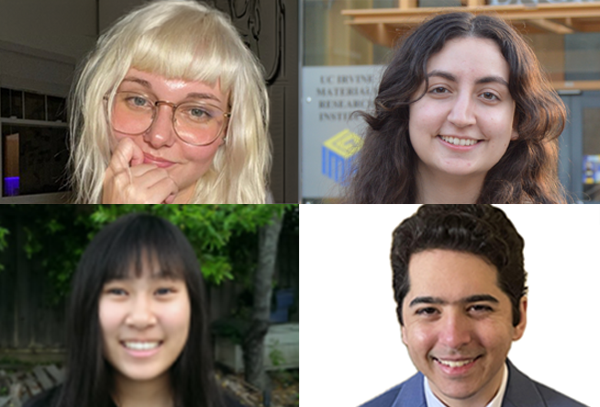Four Engineering Graduate Students Named NSF Research Fellows

Pictured clockwise, from top left, are NSF graduate research program fellows Maya Brandy, Maya El-Ajouz, Daniel Jilani and Valen Yamamoto.
June 10, 2024 - Four Samueli School students have received National Science Foundation (NSF) Graduate Research Fellowship Program (GRFP) awards this year. Maya Brandy, Maya El-Ajouz, Daniel Jilani and Valen Yamamoto are among 12 recipients from UC Irvine.
The GRFP is a competitive program that recognizes and supports outstanding students who are pursuing research-based graduate degrees in science and engineering. The five-year fellowship offers up to three years of financial support, covering tuition and fees.
Maya Brandy graduated from UCI in 2023 with a bachelor’s degree in aerospace engineering. She was a student researcher in Associate Professor Natascha Buswell’s STEM Equity Research Group, focusing on understanding the experiences of engineers in both academic and workplace contexts, as well as graduate engineering education and faculty development methods. She also served as a peer academic adviser for the Samueli School, and she was a project manager and lead thermal engineer for UCI Spacecraft Thermal Management Systems, a senior design project that is developing a variable emittance device for satellites. Brandy is currently pursuing a doctorate at UC San Diego in mechanical engineering.
Maya El-Ajouz earned her bachelor’s degree from UCI this year in civil engineering with a specialization in environmental hydrology and water resources. She served as president of the UCI chapter of Engineers for a Sustainable World during her junior year and recently led the re-establishment of UCI’s Engineers Without Borders chapter. She plans to continue at UCI to earn a doctorate in civil and environmental engineering under the advisement of Assistant Professor Shakira Hobbs.
“Receiving the GRFP is indicative of my parents' hard work that allowed me to be successful in pursuing my dreams,” said El-Ajouz, who is a first-generation Lebanese-American college student. “Anxiety often made me doubt my abilities, but I was able to gain confidence in myself through pursuing the multitude of opportunities that UCI had to offer, and receiving this fellowship validates my aptitude for research and leadership.”
El-Ajouz researches anaerobic digestion (AD), a biochemical process that breaks down organic material, such as food waste, without oxygen to produce methane that can be captured and used as an alternative energy source. Since AD lowers greenhouse gas emissions from landfills while producing renewable energy, she hopes to implement this technology in underserved communities with waste management and energy issues, such as those in Lebanon, to address climate change and uplift vulnerable populations.
Daniel Jilani graduated from UCI in 2023 with a bachelor’s degree in electrical engineering and is a doctoral student at the University of Southern California. At UCI, he worked with Associate Professor Hung Cao on various electrocardiogram algorithms including Lullaby, an innovative algorithm for tracking fetal heart rates.
At USC, Jilani is developing neurotechnology algorithms to transform clinical therapies for neurological disorders, such as major depression, by decoding and modulating abnormal brain activity. In particular, he is working on modeling the effect of deep brain stimulation therapy on large-scale brain activity to build closed-loop systems that could regulate the activity. Using deep brain stimulation therapy to more accurately model the brain could reveal explanations behind neuropsychiatric and motor disorders and improve treatment methods.
“This fellowship acknowledges my capability to become a good scientist and supports fulfilling that goal,” said Jilani. “I would like to thank my doctoral adviser Maryam Shanechi, director of the USC Center for Neurotechnology, and undergraduate adviser Hung Cao for their mentorship and for donating their time to give feedback on my GRFP application.”
Valen Yamamoto graduated from UCI in 2023 with a bachelor’s degree in computer science engineering. She conducted research in robotics and cyberphysical systems under Yasser Shoukry, an associate professor of electrical engineering and computer science. Yamamoto will continue her research at UCLA where she plans to earn her doctorate. Specifically, she researches developing frameworks for cyberphysical or robotic control that are candidates for hard safety guarantees. While most current solutions use deep learning or probabilistic solutions that are easier to run, Yamamoto is researching ways to quickly and practically synthesize control systems without sacrificing safety.
“This fellowship gives me the ability and funds to pursue my own lines of research without having to get any other outside funding,” said Yamamoto. “It's also helpful to know that senior researchers in this field think that this line of research has merit.”
– Lilith Christopher
